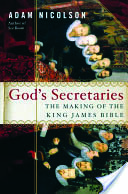
I have wanted to discuss this topic all year, so this is my last opportunity to mention that 2011 marks the 400th anniversary of the King James Version of the Bible, a book that had a deep impact on Western culture.
The Bible was originally written in Greek and Hebrew, but soon was translated into other languages so that a wider audience could understand its teachings. The most influential translation was the Latin version known as “The Vulgate,” produced by St. Jerome in 382.
By the Middle Ages most people couldn’t understand Latin, and there was great pressure to translate the Bible into languages spoken by various ethnic and nationality groups. The Catholic Church resisted, however, branding scholars who attempted to meet this need as heretics. For example, 16th century scholar William Tyndale was burned at the stake for producing an English Bible.
The religious revolt in Europe, known as the Protestant Reformation, caused translations into modern languages to appear throughout the continent. When England’s Queen Elizabeth I died, she named Scottish King James VI to succeed her, and he becoming James I of England. As he traveled to London to be crowned, he was presented with a petition signed by more than 1,000 Puritans demanding changes in English religious practices.
The principal result of this came the following year when the King appointed a committee of 54 theologians, scholars and linguists to create a new English Bible by referring to ancient – as well as Jewish and Greek Orthodox – sources and attempting to reconcile interpretations of the radical and moderate Protestant factions.
The King James Bible (“Authorized Version” in England) became the best-selling Bible in history. Experts say it is likely that billions of copies have been published since its publication in 1611. Unlike most books, which are meant to be read silently, the KJV was meant to be read aloud and its language has a grand, poetic quality.
This translation coined more than 300 expressions that are still used in our language today, including these familiar ones:
– The apple of his eye
– Signs of the times
– A law unto themselves
– The writing on the wall
– The powers that be
– Am I my brother’s keeper?
– Let my people go.
Still, many modern Christians find the archaic words like “thee” and “thou”, and the sometimes unusual sentence structures, difficult to understand; they prefer one of the many modern translations of the Bible that have taken significant market share lately.
This year saw many celebrations throughout the English-speaking world to mark the 400th anniversary of the KJV, including readings of the complete Bible, lectures, concerts, exhibits and plays. Celebrations included the following:
– A reception hosted at the Vatican Embassy in Washington, D.C. allowed guests to see a traveling exhibition that was on its way for display in Rome.
– At Christian Science headquarters in Boston, the Mary Baker Eddy Library hosted a KJV display where visitors could copy by hand verses in the same way that monks and scribes reproduced Scripture before the invention of the printing press.









